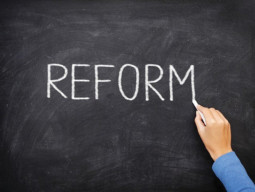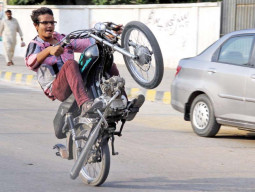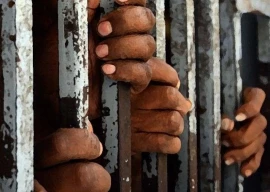Yousaf Hasan is a man of great intellect and integrity. Born in Kala Gujran, Jhelum, the Urdu and Punjabi language poet and critic, started writing literary criticism under the guidance of Ahmed Nadeem Qasmi, and considers Iqbal Kausar his mentor.
The Express Tribune tried to explore his favourite themes and dreams about literature.
From a literary point of view, Yousaf Hasan said Urdu has established its own tradition in Punjab. “I must confess my information is confined to Punjab, but let me say the situation of Urdu literary criticism is not satisfactory here.”
He felt that artistic and aesthetic concepts need to be made more scientific. “Literary criticism must highlight the distinctive artistic and aesthetic qualities of a piece, but amazingly, in our region, the poetic form is recognised only by radeef, qafia (opening and closing stanzas) and the number of lines. The analysis of poetic composition and rhythm is also necessary.”

To a question on poets serving as critics, he said, “In every language, informed prose, poetry and fictional literature blooms quite late. Urdu and Punjabi literary criticism was primarily written by poets. For example, Mian Muhammad Bakhsh in his famous masnavi Safarul Ishq, generally known as Saiful Maluk, posted literary comments on the poets of earlier period and his contemporaries.”
“Every poet’s literary concept is formed by his outlook,” he said. His literary awareness helps him polish his poetry. Several Urdu poets in Punjab have written good literary criticism, but its quality has gone down, as now, they write just for book launching ceremonies. “In reality, it is the poets who can write better literary criticism, but without philosophical content, criticism remains deprived of depth and significance.”
Talking on the prospects of progressive literature in the internet age he said, “The definition of progressivism presented by progressive scholars and literary figures is incomplete if not totally wrong. The targets of progressivism have not been well-defined. While general progressivism forms social relationships which can help individuals in developing their multi-dimensional intellectual and natural qualities, literary progressivism is concerned with literary concept-building, literary criticism and literary creativity. In all the three branches, artistic and aesthetic aspects are more important.

“Today’s progressive literature lacks past glory. In fact, both general and literary progressivism needs to reject exchange value and free market economics, as under their influence, all cultural manifestations including literature are becoming a market commodity. The internet has provided better avenues to understand and promote progressivism.”
On the status of progressive literature in the languages spoken in Pakistan, he said, “Urdu arrived in Pakistan from outside. Every language spoken in Pakistan is the national language of its speaker. Pakistan is a multilingual state. Punjabi civilisation being 4,000 years old, its language and literary heritage is very rich. The strength of any language results from the number of its singular verbs, which make compound and complex verbs. In Punjabi, there are around 2,500 singular verbs, while in Urdu, the number of singular verbs is about 350. I think Punjabi can describe progressivism better.”
About the official patronage of literature and the status it enjoys, he said, “Since the creation of Pakistan, the ruling elite has been using every cultural manifestation for their own aims. They want to turn literature into a market commodity. Under these conditions, we cannot expect real and free growth of literature. All the literary men, especially progressive writers, should establish new kinds of organisations which remain free of the influence of state institutions. This is the only way real literary creativity can grow.”
Published in The Express Tribune, July 26th, 2013.
COMMENTS (21)
Comments are moderated and generally will be posted if they are on-topic and not abusive.
For more information, please see our Comments FAQ


1725443747-0/Untitled-design-(5)1725443747-0-165x106.webp)














I fully agree with Maryam Pathan. Urdu literature is at par with any literature of the world.
Shafqat Abbas: Dude! Urdu literary scene has not been so dull as you have put it. If some literary productions lack aesthetic value, it doesn't mean all lack it. It may have been true that in many languages, informed prose, poetry and fictional literature bloomed quite late, but Urdu saw the growth of its literature much early and has the distinction of being written and spoken in all the continents of the world.
Literary books abound in the markets. What they lack is artistic and aesthetic worth. Literary criticism and literary creativity is on the rise these days but literary concept-building is found nowhere. Yousaf Hasan has taken the lead.
The official patronage of literature has not made much of difference even in totalitarian governments. The ruling elite has nothing to do with the cultural manifestations. The popular books of literature when they sell automatically become a market commodity. The real and free growth of literature depends on the aims and objectives of the literary men i.e. to what extent they are related to the public and society's welfare. Organizations throughout the history of literature have never remained free of the influence of state institutions. It has been true in both the socialist and capitalist countries. What matters is the end-result of creativity.
None can deny the importance of what Yousaf has said, but why prefer progressive writers only? Other writers are also doing the job well. Those denying the “literature for the sake of literature” concept are on equal footing with progressive writers.
Dear Hasan, Being a professor of Urdu language why your information is just confined to Urdu in Punjab. How’s it possible that a teacher of the language shouldn’t know the overall picture of the Urdu language growing in different regions.
The art of analyzing Urdu literary works has not evolved as in other languages. The subject is not much explored. Yousaf Hasan at least has posed questions which should find the right answers. The ultimate condition of Urdu literature without criticism can be easily gathered from the present day counterfeit creativity. Criticism cannot prevent fake literature from being written. But it does make its business to see that fake creativity does not establish itself as genuine one.
Dear Yousaf. If you haven't had the luck of getting your book published, not to talk of the lavish book ceremonies, and foreign tours it's all your own fault. And your saying that a majority of poetry and fiction writers are pseudos is simply a prejudiced statement. Nobody can prevent a good writing from recognition and popularity.
Dear Mr. Hanif Fayyaz, The mushroom growth of pseudo poetry and fiction writers has not been without the backing of vested interests. Despite the fact that their work has no literary value they get a larger share of book reviews, have lavish book ceremonies, and easy access to enough funds to support their publications and foreign tours, while the ones with genuine creativity, of course with a few exceptions, have been pushed tightly into the corner and largely ignored.
I would like to know from Yousaf Hasan the details of the cases of the ruling elite using every cultural manifestation for their own aims since the creation of Pakistan. Please let me have an answer.
There is no doubt that Urdu has established its own tradition in Punjab. I fully agree with Yousaf Hasan. While in Gulf I gave some Urdu books of prose and poetry to my Indian friends. They included Hindus, Sikhs and Muslims from Hyderabad Deccan, Sakandarabad, Bhopal, Delhi Luckhnow, Jaypur etc. They couldn't believe that these books were from the Punjabi writers. They were really amazed. They said Urdu is alive in Pakistan now having an official backing as India is encouraging only Hindi. They asked me for more books on Pakistani Urdu literature -- both fiction and poetry. They said in India some private literary organizations were trying to promote Urdu but as people were compelled to know Hindi for jobs it has resulted in the suppression of Urdu there.
Mr.Yousaf Hasan is right. Most of the writers are producing market commodity that has no artistic and aesthetic content. Their works do not attract the present Urdu readership. Sadly, this is the main reason the current generation has turned to English literature.
I am a Punjabi educated woman and have served Urdu and Punjabi literature by teaching students at the university level. I don't see any conflict between the two languages. The writers of both languages have a great sense of social excesses and better understanding of progressivism. Let me quote one Punjabi poet Munshi Latif Gujrati's famous poem "Amrica, Roos wich e ja kay beh rayan ain, Pakistan daa wi phaira laa moulaa." There is another famous Punjabi poet Pir Fazal Hussain Fazal Gujrati. Just listen to him: " Mullan larday phirday rehnday ek doojay dey wairy, Ek doojay nooun hus hus milday japhay maar sharaaby." There are many others as well.
It was Urdu progressive writers who introduced realism, objectivity, class-struggle and social and economic woes of the teeming millions, hitherto largely ignored, to Urdu language. They wrote against abject poverty, social injustices and exploitative capitalist economy, Let me know any Punjabi language writer with a deep sense of social injustices and understanding of progressivism.
The hypothesis that Punjab is the birthplace of Urdu language has a grain of truth. If we accept the influence of Persian language vocabulary on Urdu it automatically establishes the Urdu-Punjabi link. I was amazed to hear Persian spoken by Iranians which had some Punjabi words. The most interesting aspect was to hear Punjabi abuses ( decency prevents me from quoting them) in Persian language. Such is the proximity between both languages. I urge scholars of both languages to focus on this aspect as well.
Terming Urdu as coming from outside reminds me of the days when some Hindi lovers termed it as a Muslim language thus declaring it as non-Indian. In the same way, Yousaf Hasan is trying to take Urdu as a non-Pakistani language or as his knowledge is limited to Punjabi Urdu only as he professes that's why he perhaps takes it as a non-Punjabi language knowing that it's a national language of Pakistan. His statement lacks clarity.
Discussion about the birth and growth of Urdu language is useless. Urdu is the only modern language to whose literature people of all races living in India and Pakistan and all religious and literate communities have made substantial contribution: Punjabi, Pushtun, Sindhi, Baloch, Hindus, Muslims, Christians, Sikhs, Jains, Parsis, all have drunk from its well and all have poured their ambrosia in it. Urdu is the only truly nationally integrated language.
I think the exposure to challenging works of literature is good for us.
Being an a litterateur and being a citizen are not two mutually exclusive things. Yousaf Hasan has opened up the discourse. Let's revive the audience for serious literature again.
Old-fashioned critical postulations are always difficult to accept. Great critics see the usual literary debates of their day in the mirror of their new ideas. Yousaf Hasan’s fresh approach is laudable and stimulating.
It's amazing to know that Urdu has only 350 singular verbs and still its literature has such a vast diversity and enormous popularity. Dear professor seems to suffer from amnesia and forgets that Mehmood Sheerani takes Punjab as the birthplace of Urdu language. Urdu originated from Punjabi "khari boli", so it hasn't come from the outside in Punjab and has never been foreign to Punjabis.